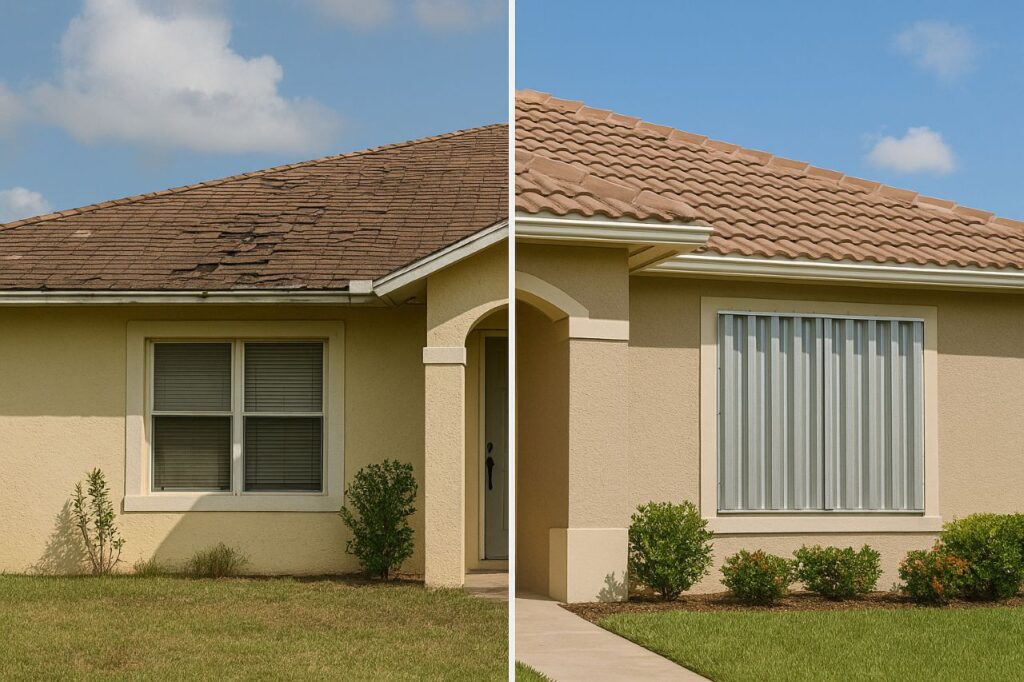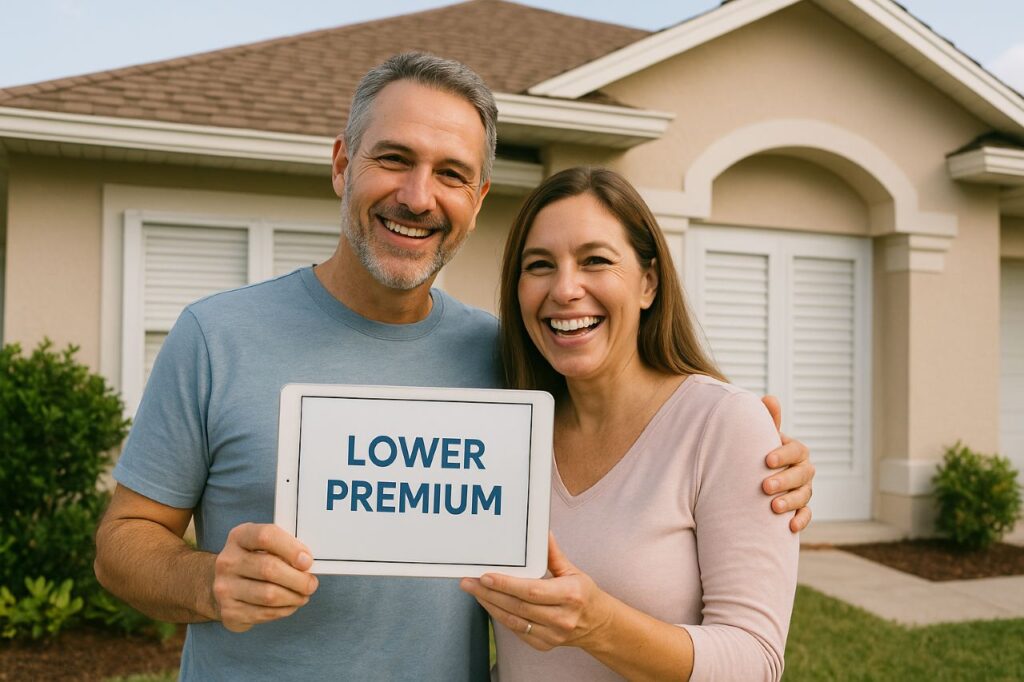Cape Coral Home Insurance Rates: 7 Shocking Facts
Cape Coral homeowners insurance prices are a sizzling issue among Floridian homeowners lately. Famed for its beautiful canals, pleasant climate, and population growth, Cape Coral is a great place to reside—but not a place invincible to the stresses of Florida’s distinctive topography. From hurricane risk growing at an alarming rate to soaring home values, all sorts of conditions make Cape Coral home insurance so important yet so expensive.
In this article, we’ll demystify all there is to know about Cape Coral home insurance rates—why they are so high, how to keep them in check, and what savvy homeowners are doing to reduce their premiums. Whether you’re a first-time buyer or simply want to change insurers, knowing the ins and outs of these rates will save you time and money. We’ll delve into actual case studies, reliable sources, and actionable advice—all specific to the Cape Coral area.
Table of Contents
Why are Cape Coral Home Insurance Rates Rising?

Over the past few years, Cape Coral home insurance rates have increased dramatically, and many homeowners are worried and perplexed. The increase in premiums is not random—it’s driven by a mix of environmental hazards and economic factors specific to the Southwest Florida area.
Higher Risk of Hurricanes and Flooding
Cape Coral, dubbed the “Waterfront Wonderland,” boasts over 400 miles of canals—leaving it particularly prone to flooding and storm surge. This landscape makes many homes qualify for FEMA-mapped Special Flood Hazard Areas (SFHAs), where flood insurance is not just suggested but often required.
In the past, hurricanes such as Irma in 2017 have caused extensive damage throughout the area. In its review of Hurricane Irma, NOAA estimated that hurricane damage was more than $50 billion, and Cape Coral was one of the hard-hit areas. The growth in claims due to such occurrences boosts the aggregate risk profile in the region and compels insurers to raise Cape Coral home insurance rates.
In addition, FEMA also regularly revises its flood maps, and the previously low-risk properties can at once be designated as high-risk ones. You can check the current risk of your property on FEMA’s Flood Map Service Center. If your residence is presently located in a higher-risk zone, you are most likely to experience an increase in your premium despite never making a claim.
Quick Tip: At all times be aware of changing FEMA maps and review your agent each year to re-evaluate your risk zone.
Increasing Building and Repair Fees
Another key contributor to increasing Cape Coral home insurance premiums is the skyrocketing cost of repairing a home. Post-storm, the demand for contractors and construction materials shoots through the roof. This creates a rise in the cost of building, which impacts directly on the amount that insurers have to pay out when compensating for damage.
Based on a report by CoreLogic, the reconstruction cost estimates in Florida have increased dramatically after 2020 because of labor shortages, inflation, and supply chain issues. In Cape Coral, where new development has exploded, this problem is even more acute.
Insurers work on the basis of replacement cost of your property—not its market value. This implies if it takes more to rebuild, your policy should be adjusted to account for this additional expense. A Cape Coral homeowner in our area reported through a News-Press interview that their premium was raised 20% in 2023 when local construction estimates increased, though nothing had been done to the property.
Rates for Cape Coral home insurance will thus need to account for:
- Cost of qualified labor.
- Availability of materials post-disaster.
- Updated building code compliance for hurricane resistance.
Takeaway: Even if your home remains damage-free, market dynamics in the region will influence your insurance premiums over time. Consider conducting a home appraisal every couple of years and sharing the updated data with your provider to ensure accurate coverage without overpaying.
Key Factors that Affect Your Cape Coral Home Insurance Rates

When insurers calculate Cape Coral home insurance rates, they consider much more than your home’s value. A number of individual variables—everything from the age of the property to your financial behavior—may contribute significantly to what you pay annually for coverage. Here, we’ll examine the most impactful factors and how you can get the jump on them.
Property Age and Structural Features
The age and state of your residence are two of the most direct influences on your premium. Older houses in Cape Coral tend not to have contemporary safety devices and can have older roofing, plumbing, or electrical systems—making them more prone to damage and more costly to insure.
Why it matters:
- Pre-2002 homes are not usually compliant with Florida’s revised building codes.
- Roofs that are more than 15–20 years old typically exclude homeowners from wind mitigation discounts.
Cape Coral home insurance premiums are generally lower for newer homes that are:
- Constructed using hurricane-resistant materials.
- Equipped with impact-rated doors and windows.
- Installed with reinforced roofs.
The Florida Department of Financial Services states that homes with wind mitigation features can qualify for up to 40% in premium discounts.
Checklist to Reduce Your Rates:
- Replace your roof with new, wind-rated materials.
- Install shutters or impact glass.
- Make sure your home is current with electrical/plumbing codes.
Credit Score and Claims History
While it might be surprising, your credit score plays a significant role in the cost of Cape Coral home insurance. In Florida, the use of credit-based insurance scores during the underwriting process is legal. A higher score usually indicates financial responsibility and lower risk of making claims.
How credit score affects rates:
- Excellent (750+): Can get lower-than-average premiums.
- Fair to Poor (<650): May have much higher rates.
Additionally, if you’ve made multiple claims—especially water or roof damage claims—insurers may classify your property as high-risk, which will raise your rate regardless of your current credit standing.
Tip: Check your credit report annually through AnnualCreditReport.com to catch and fix any errors before they impact your insurance quotes.
Claim History Tips:
- Avoid small claims that don’t justify premium increases.
- Maintain proof of repairs or upgrades to show insurance companies.
- Opt for a higher deductible to prevent making claims for small damages.
By being smart about your credit and avoiding unnecessary claims, you can prevent your Cape Coral home insurance premiums from unnecessarily rising.
Comparing Top Insurance Providers in Cape Coral

When purchasing homeowners insurance, the provider you select can greatly impact both your premiums and the overall quality of your coverage. The Cape Coral home insurance premiums available from various carriers depend on their underwriting factors, financial condition, and appetite for risk in Florida’s sensitive market.
Local vs. National Carriers
Residents of Cape Coral generally have a choice between large national insurers or a regional Florida-based insurer. Each has benefits and drawbacks depending on your situation.
Best Insurance Providers in Cape Coral:
- State Farm – Large national provider that is competitive in bundled policies and large agent pool.
- Tower Hill Insurance – Regional Florida provider who excels in windstorm and high-risk property insurance.
- Citizens Property Insurance Corporation – State-supported insurer serving as the ultimate fallback for homeowners who are unable to obtain coverage elsewhere because they are too high-risk.
| Provider | Avg. Annual Premium | A.M. Best Rating | Highlights |
|---|---|---|---|
| State Farm | $2,500 | A++ | Auto + home bundles, strong network |
| Tower Hill | $2,800 | A | Florida-focused wind coverage |
| Citizens | $3,100 | Not Rated | Covers high-risk properties |
While State Farm has some of the lowest Cape Coral home insurance quotes, it might have more stringent standards for older homes. Citizens, although available, has coverage restrictions and tends to be pricier. Consider both affordability and coverage levels when comparing.
Tip: Utilize the Florida Office of Insurance Regulation Rate Comparison Tool to find a side-by-side comparison of premium quotes from several companies.
What to Consider When Shopping Quote-to-Quote
Reading the fine print in your insurance quote is as essential as knowing the premium amount. Low Cape Coral homeowners’ insurance premiums may not be worth much if the coverage is poor or the deductible is excessive.
The following is what to consider when comparing insurance quotes:
- Deductibles: The higher deductible will reduce your premium but could cost you more out of your pocket when you file a claim.
- Coverage Limits: Make sure the replacement value equals local reconstruction costs—not market value.
- Perils Covered: Flood, mold, or wind damage may be excluded unless specifically added.
Customer Service & Claims History: Check complaint histories through the National Association of Insurance Commissioners (NAIC).
Bonus Tip: Consider getting quotes from at least three providers and check online reviews from Cape Coral residents. Local Facebook groups or platforms like Nextdoor often feature real experiences with claims and service quality.
Comparing providers side-by-side ensures you’re not just chasing the cheapest premium but getting long-term value and peace of mind from your Cape Coral home insurance rates.
7 Shocking Facts About Cape Coral Home Insurance Rates That May Surprise You

Though most Florida residents anticipate more costly insurance rates, the truth about Cape Coral home insurance rates can still surprise homeowners. Whether it is the unadvertised risks in your policy or the unexpected ways you can save, these seven facts will give you a greater insight into what really influences insurance rates in this beach city.
1. Cape Coral Home Insurance Rates Are Almost Twice the National Average
The typical Cape Coral homeowner pays much higher insurance costs than the national average. The Insurance Information Institute (III) issued a 2023 report indicating that the average U.S. homeowner pays roughly $1,428 annually. Cape Coral homeowners’ insurance costs often top $2,800, particularly for homes in flood zones.
Why? Florida’s geography makes it vulnerable to hurricanes, flooding, and high property damage exposures—making it one of the costliest states for homeowners insurance.
2. Flood Insurance Is Not Included in Most Standard Policies
Many homeowners incorrectly believe that their base policy includes all natural disasters. Flood damage is actually not covered on regular homeowner’s insurance in Florida. This is particularly concerning in Cape Coral, where more than 40% of homes fall within FEMA-defined Special Flood Hazard Areas.
In order to really safeguard your dwelling, you have to buy an independent flood policy—usually under the National Flood Insurance Program (NFIP), which can be accessed at FEMA.gov.
Not adding flood insurance can result in catastrophic out-of-pocket costs following a storm, all while maintaining high Cape Coral home insurance premiums that don’t account for one of the region’s largest threats.
3. Putting a New Roof On Can Cut Your Premium by as Much as 40%
A new, wind-resistant roof doesn’t just protect your home—it can slash your Cape Coral home insurance premiums. Florida statute mandates that insurers provide discounts for wind mitigation features, such as:
- Roof shape (hip roofs qualify for better rates).
- Nail type and spacing.
- Secondary water-resistance layers.
- Roof-to-wall attachment upgrades.
It is reported by the Florida Department of Financial Services that homeowners can save 20–40% of their windstorm premiums by undertaking qualifying upgrades. To qualify for these discounts, a certified wind mitigation inspection is necessary.
Real Example: A homeowner in Cape Coral saved more than $1,000 per year after getting impact-resistant shingles and filing a mitigation report.
4. Your Credit Score Affects Your Home Insurance Premium
In Florida, insurers are allowed to use credit-based insurance scores to help determine risk and premium levels. That means your credit behavior—not just your claim history—can increase or lower your Cape Coral home insurance rates.
The Consumer Financial Protection Bureau (CFPB) warns that poor credit may result in up to 30% higher premiums, even if you’ve never filed a claim.
Pro Tip: Check your credit report for free on AnnualCreditReport.com and dispute any errors to prevent unnecessary rate increases.
5. Filing Small Claims Can Haunt You for Years
Numerous homeowners file small claims for insurance under the assumption it won’t hurt anything. The reality is, every claim you file becomes a part of your CLUE (Comprehensive Loss Underwriting Exchange) report that insurers use to evaluate risk.
A pattern of even small claims can result in:
- Rate hikes for 3–5 years.
- Non-renewal notices.
- Difficulty in affording new coverage.
This practice can rapidly drive already high Cape Coral home insurance prices even higher.
Advice: File only for major losses. Pay minor losses out-of-pocket to preserve your long-term rate stability.
6. Cape Coral Older Homes Might Be Non-insurable with Private Insurers
Properties constructed prior to contemporary building regulations (particularly those before 2000) tend not to have hurricane-proof construction, increasing their susceptibility. Consequently, private insurers either decline to provide cover or demand prohibitively expensive premiums.
Here, residents are left with no choice but to approach Citizens Property Insurance Corporation, the state-run insurer of last resort in Florida, which usually involves higher rates and restricted policy choices. Find out more at CitizensFLa.com.
If you’re buying or already have an older home, expect higher Cape Coral home insurance premiums, and think about making improvements to regain private market eligibility.
7. Smart Home Devices Can Earn You Hidden Discounts
Surprisingly, most Cape Coral homeowners overlook simple discounts by not reporting their installed smart home devices. Examples include:
- Smart smoke detectors.
- Water leak sensors.
- Security cameras.
- Monitored alarm systems.
…can reduce your Cape Coral home insurance premiums by 5–10% or more, depending on the company. The tools minimize fire, theft, and water damage risks—prompting insurers to reward those who take steps to protect their homes.
Pro Tip: Call your insurer and inquire about “protective device discounts.” Offer purchase and installation receipts to qualify.
These seven facts show just how intricate—and surprising—the world of Cape Coral home insurance rates actually is. By being well-informed and taking proactive measures, homeowners can more effectively control their premiums and prevent expensive surprises.
Smart Ways to Lower Your Cape Coral Home Insurance Rates

Although Cape Coral home insurance rates are among the highest in Florida, there are practical steps homeowners can take to reduce their premiums. From upgrading your home to bundling policies, strategic choices can lead to significant savings over time—without compromising coverage.
Upgrade Your Home for Wind Mitigation Discounts
Cape Coral is situated in a hurricane-prone region, so wind mitigation upgrades are not only a wise decision, but also profitable. Insurance companies tend to give deep discounts on houses that are prepared to resist wind and storm damage.
Well-liked Upgrades That Help Reduce Rates:
- Impact windows and doors.
- Heavy-duty roof strapping or clips.
- Hurricane shutters and garage bracing.
- Secondary water resistance barriers beneath roofing.
On FloridaDisaster.org, it is explained that homeowners who get a wind mitigation inspection and provide evidence to the insurer can enjoy up to 40% discounts on windstorm premiums.
Pro Tip: Get a certified wind mitigation inspection and send in the report to your insurance provider. It’s once-per-property and often ends up paying for itself in the first year.
Example: A homeowner in Cape Coral lowered his yearly premium from $3,000 to $2,200 after putting in impact windows and filling out a mitigation form.
Bundle Insurance Policies and Look for Loyalty Discounts
Insurance providers prefer to keep their customers for the long term—and they tend to reward them with discounts too. Bundle your policies as one of the easiest ways to lower Cape Coral home insurance premiums.
How Bundling Helps:
- Bundle home and auto insurance from one carrier.
- Gets payments and renewals simplified.
- Can provide up to 20% in bundled discounts.
Best Companies with Bundling in Cape Coral:
- State Farm – Famous for auto-home bundle.
- Progressive – Has competitive bundling deals.
- Allstate – Provides bundle discounts and loyalty rewards.
Besides, insurers also award loyalty discounts to loyal customers who have been claim-free for long periods of time. Even if you are content with your present provider, it is worthwhile reviewing every few years to check if there are more attractive loyalty deals or promotional offers.
Increase Your Deductible Carefully
Your deductible—the money you pay before your insurance company steps in—has a direct impact on your premium. Increasing it can help you get lower Cape Coral home insurance rates, but it will also cost you more out of pocket in the event you make a claim.
Common Deductible Choices:
- $500: Higher premium, less out-of-pocket.
- $1,000: A balanced choice.
- $2,500+: Huge savings but higher risk with claims.
Tip: Raise your deductible only if you have sufficient emergency savings to pay the amount in the event of a disaster.
Example: Increasing a deductible from $1,000 to $2,500 reduced a Cape Coral homeowner’s premium by $400 per year.
Conduct Regular Policy Reviews and Re-shop Annually
Home insurance isn’t a “set it and forget it” product—particularly in a fluctuating market like Florida’s. A lot of Cape Coral homeowners are paying more than they need to just because they haven’t shopped around in years.
What to Look Over Each Year:
- Property value changes or improvements.
- New discounts you might currently be eligible for.
- New building codes or neighborhood updates.
Tools to Utilize:
- Florida’s Rate Comparison Tool.
- Independent brokers who have expertise in Cape Coral policies.
Tip: Set a calendar reminder to check your policy 60–90 days prior to renewal. Re-shopping once a year may save you hundreds—even if you remain with the same carrier following renegotiation.
By implementing even a few of these clever tips, homeowners can lower their Cape Coral home insurance premiums significantly while enhancing their property’s security and long-term worth.
Conclusion: Take Control of Your Cape Coral Home Insurance Rates

Shopping for Cape Coral house insurance premiums can feel daunting at first, but through the proper information, you can make sound decisions that safeguard your residence and your finances. From comprehending how hurricane exposure and construction costs affect premiums to taking advantage of discounts offered, each decision you make contributes to what you pay—and what you are covered for.
Whether you’re a new homeowner or someone reviewing their current policy, don’t underestimate the power of annual reviews, wind mitigation upgrades, and comparing quotes. Keep track of FEMA flood zone changes, monitor your credit score, and avoid unnecessary claims whenever possible. Also, consider bundling policies and asking your provider about loyalty and safety device discounts.
Ready to act? Begin by checking your current coverage and obtain multiple quotes from reputable providers. You’ll be amazed at how much you can save—and how much more protected your home will be—by taking control of your Cape Coral home insurance premiums today.
Read Also: Teaching from Home Insurance: 7 Crucial Benefits You Shouldn’t Ignore
Frequently Asked Questions (FAQs)
Why are Cape Coral home insurance rates so high?
Cape Coral is located in a high-risk hurricane and flood zone. These environmental risks, combined with rising construction costs and frequent insurance claims in the area, drive up premiums.
Does standard home insurance in Cape Coral include flood coverage?
No. Most standard home insurance policies in Cape Coral do not cover flood damage. You’ll need to purchase separate flood insurance, typically through the National Flood Insurance Program (NFIP).
Can I reduce my Cape Coral home insurance rates?
Yes. Common strategies include:
1. Installing hurricane-resistant upgrades (e.g., impact windows, reinforced roofing)
2. Bundling your home and auto insurance
3. Raising your deductible (if you can afford it)
4. Avoiding filing minor claims
5. Improving your credit score
How often should I compare or update my home insurance policy?
At least once a year. It’s smart to reassess your policy before each renewal. Factors like home improvements, property value, and updated flood maps may affect your rates or required coverage.
Is Citizens Insurance a good option in Cape Coral?
Citizens Property Insurance Corporation is a state-backed last resort option for homeowners who can’t secure coverage in the private market. While it provides essential protection, it often comes with higher premiums and fewer customization options than private insurers.
What’s the average cost of home insurance in Cape Coral?
While it varies by property type and provider, most homeowners in Cape Coral pay between $2,500 and $3,500 per year for home insurance, depending on flood zone, home age, and policy features.







